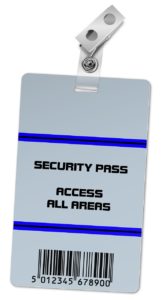
There’s a number of options out there when it comes to access control cards. Which is right for you?
There’s a huge range of access control systems out there, some of them relying on metrics like face scans or fingerprints whereas others rely on physical cards for users to interact with the system. When it comes to access control cards, there are actually quite a few options out there that really boil down to what your specific needs are. That’s why we’re taking a look at four of the most common kinds of access control cards and weighing what their uses are.
1. Traditional Key Cards
If you’re familiar with access control systems, this is typically what is used and they are incredibly common, even being used by university dormitories and hotel rooms. These cards can easily be placed in a wallet, attached to a belt, or worn around your neck on a lanyard, meaning that they’re accessible and easy to use. All the user needs to do is place the card in a reader and bingo: access is granted. Some cards work slightly different in that a barcode is scanned or a magnetic stripe is swiped, but either way, these all pretty much do the same thing and they do so simply and in a way that is suitable if you have a large number of users and don’t need much beyond granting simple access.
2. Prox Cards
Prox (proximity) cards are similar in the sense that they’re centered around simple tasks like granting basic access within an access control system, but instead of swiping or inserting a card, you just place it near a scanner. This then scans for radio frequencies that are given off by the prox card and access is then granted. Just remember that there is sometimes a bit of a learning curve for users to find out what the distance limits are for scanning the card.
3. Active Prox Cards
Active prox cards actually have an internal lithium battery that powers them. The result of this advantage is that the card can be further from the reader without impacting usefulness, as well as the ability to store more information for more complex applications. They’re also a much more costly option as a result and typically only last five years, but for some uses, they may be the ideal option.
4. Contactless Prox Cards
Contactless smart cards are similar to active prox cards but don’t hold a battery or quite as much info, but there’s still room for things like biometric templates or attendance data. If you’re looking for something that offers additional functionality without breaking the bank, contactless prox cards may be something worth looking into.
Get in Touch with FiberPlus
FiberPlus has been providing data communication solutions for over 25 years in the Mid Atlantic Region for a number of different markets. What began as a cable installation company for Local Area Networks has grown into a leading provider of innovative technology solutions improving the way our customers communicate and keeping them secure. Our solutions now include:
- Structured Cabling (Fiberoptic, Copper and Coax for inside and outside plant networks)
- Electronic Security Systems (Access Control & CCTV Solutions)
- Wireless Access Point installations
- Public Safety DAS – Emergency Call Stations
- Audio/Video Services (Intercoms and Display Monitors)
- Support Services
- Specialty Systems
- Design/Build Services
FiberPlus promises the communities in which we serve that we will continue to expand and evolve as new technology is introduced within the telecommunications industry.
Have any questions? Interested in one of our services? Call FiberPlus today 800-394-3301, email us at info@fiberplusinc.com, or visit our contact page. Our offices are located in the Washington, DC metro area, Richmond, VA, and Columbus, OH. In Pennsylvania, please call Pennsylvania Networks, Inc. at 814-259-3999.
Do you enjoy clicking “Like” and “Follow?” Be sure to click on our official Google+, Pinterest, Facebook, Twitter, and LinkedIn pages today!